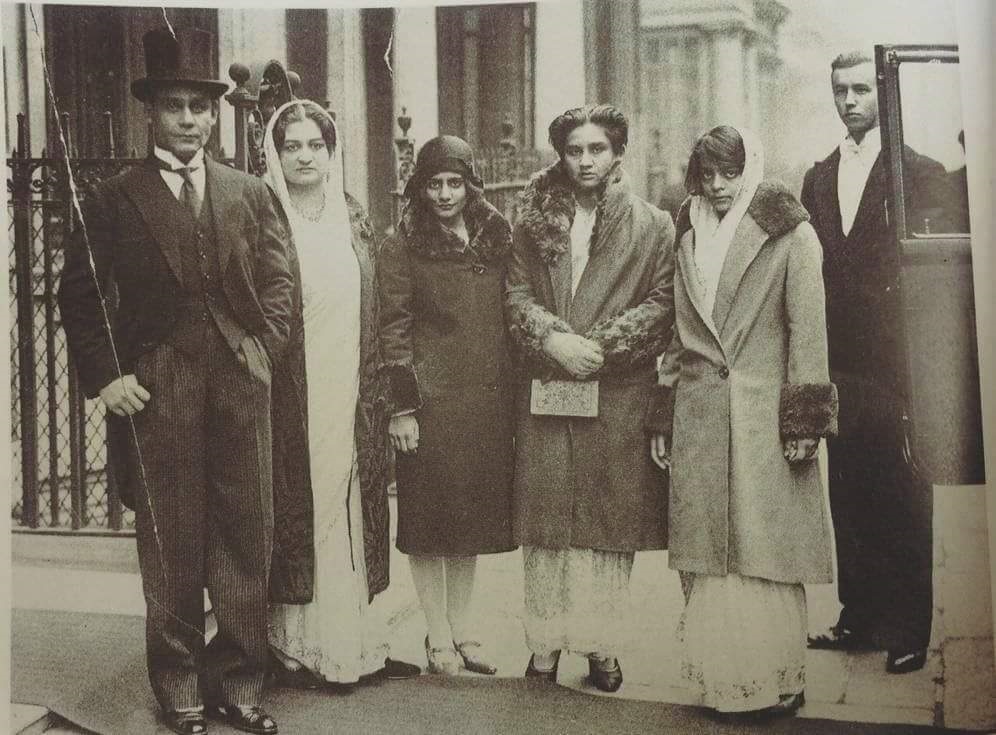Written by: Mahnaz Shujrah
Posted on: November 01, 2021 |  | 中文
| 中文
Princess Abida Sultaan with her friends on shikar (hunting) in Bhopal in 1944
“I am eighty-nine years old and have written my memoirs with the help of a daily dairy that I have kept for seventy-one years – since 1930 when I was a seventeen-year-old girl. These diaries have enabled me to reconstruct the story of my life – a story that has spanned the glorious era of the princely states, the turmoil in India as the British withdrew and the trauma of abandoning my hearth, family and heritage in Bhopal to begin a new life in Pakistan. It has been a long journey – colorful, adventurous, not always rewarding.”

Abida Sultaan with her family in London in 1932. (L-R) Nawab Hamidullah, Maimoona Sultan, Rabia Sultan, Abida Sultaan and Sajida Sultan
These are the words of Abida Sultaan in the preface of her autobiography. Born 28th August 1913, at Qasr-e-Sultani, Bhopal, she was the eldest daughter of Nawab Hamidullah Khan. She grew up under the strict discipline of her grandmother, Sultan Jahan Begum, who was the last of the four great Begums of Bhopal, who ruled the princely state for more than a century, from 1819 to 1926. Abida was declared Heir Apparent at the age of 15 and was expected to carry forward this legacy of female leadership in Bhopal. Unfortunately, the life of the princess played out very differently than it was envisioned. As Partition unfolded in 1947, Princess Abida Sultaan was the only heir to a major Indian princely state to migrate to Pakistan, leaving behind heritage, wealth and power, she came to Karachi with nothing but her only son. Starting from scratch, she built a humble residence for herself, the construction of which she personally supervised. She served in the Foreign Office of Pakistan, participated in politics and wrote extensively. She died on 11th May 2002, and is buried in the garden of her beloved home in Malir, Karachi.
Abida grew up in a world where “shikar was a way of life in Bhopal rather than a mere recreation and sport”. Along with being the Princess, she was an exceptional markswoman, a champion squash player, an avid polo player and a determined pilot. Her education was holistic, including Western academic knowledge, along with a thorough religious upbringing. Her grandmother personally took upon herself to make sure Abida learnt the Quran. As a result, Abida had read the Holy Book by the age of six, and memorized the lafzi tarjuma (translation) by the age of 8, a commendable feat at such a young age.
The title, “Rebel Princess”, was not given because she was the first woman to tread the unconventional path. In fact, Abida Sultaan had a wide range of inspirational Muslim women to look up to from within her family, the history of the subcontinent and the Islamic tradition itself. The title “Rebel Princess” was self-proclaimed, for she saw herself as a challenge to the strict discipline her grandmother imposed on her as a child. Later in her book, she gives credit to her grandmother for instilling in her the values that made her the strong, principled person that she became.
Abida’s life is eventful and moving, but the fact that she captured it in an honest and raw form is exceptionally noteworthy. Siobhan Lambert-Hurley, who wrote the introduction to the book, explains how these memoirs are uniquely multilayered and immensely significant. Abida’s account maps the changes that have occurred over the 20th century for politically active Muslim women of the subcontinent. As heir apparent and chief secretary under her father, Abida’s writings are a witness to the internal political history of the state of Bhopal. This links to the broader point, that her personal struggles were happening alongside the wider struggle of independence. Her personal story is deeply intertwined with that of Partition, and the book provides a primary source for understanding the collapse of one way of life and the dawn of a new one. Her memoirs challenge the mainstream portrayal of Muslim women as “silent, secluded and oppressed”. All in all, the book provides invaluable insights into a changing social milieu, and is useful for academic research.
Sahabzada Yaqub Khan quotes Abida Sultaan in his foreword to the book: “I believe morally there are no degrees for measuring sacrifice.” This beautifully expresses the courage and determination of a fearless woman from our history, whose role deserves to be highlighted at a time when role models are hard to come by. Memoirs of a Rebel Princess is undoubtedly one of the most inspirational books I have read.
You may also like: